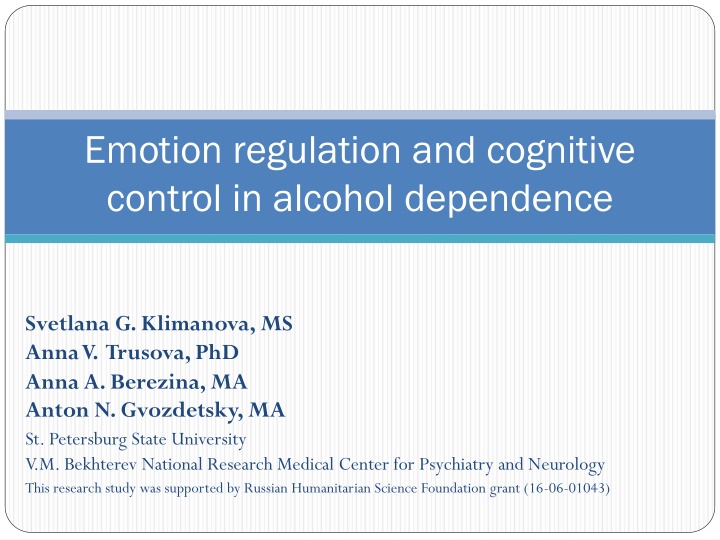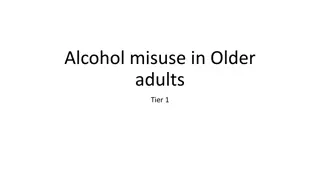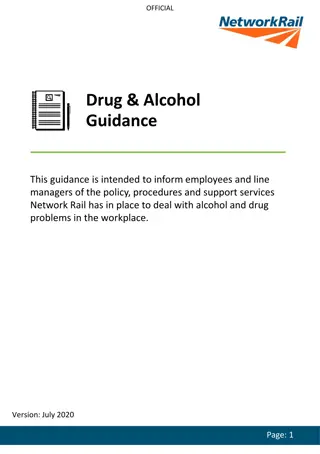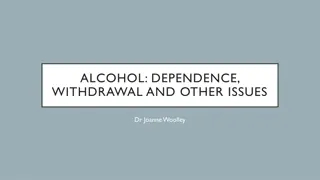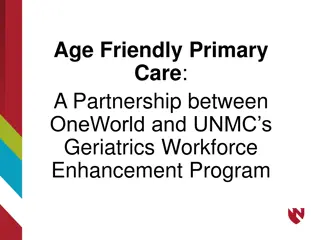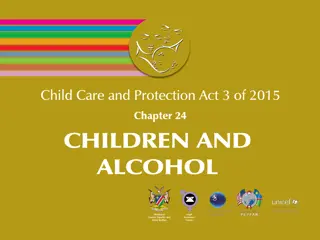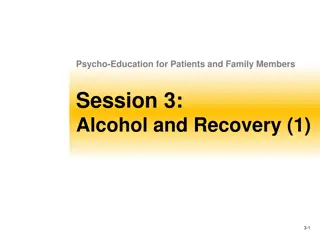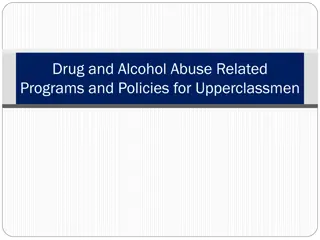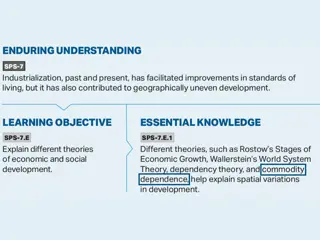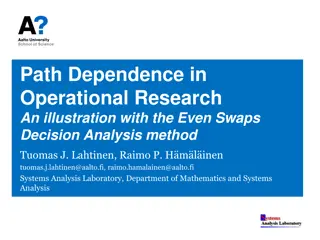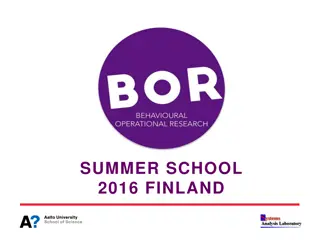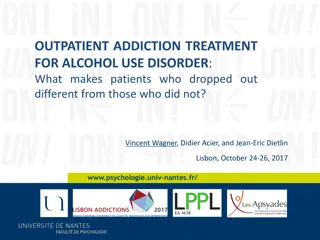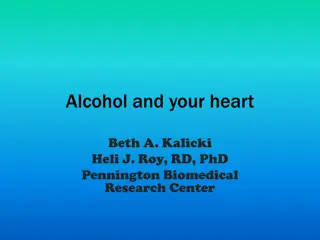Emotion Regulation and Cognitive Control in Alcohol Dependence Study
This research study focuses on emotion regulation and cognitive control in alcohol dependence among patients in Russia, exploring treatment characteristics and barriers. The goal is to understand how these factors influence sobriety maintenance post-detoxification to develop effective psychotherapeutic interventions.
Download Presentation

Please find below an Image/Link to download the presentation.
The content on the website is provided AS IS for your information and personal use only. It may not be sold, licensed, or shared on other websites without obtaining consent from the author.If you encounter any issues during the download, it is possible that the publisher has removed the file from their server.
You are allowed to download the files provided on this website for personal or commercial use, subject to the condition that they are used lawfully. All files are the property of their respective owners.
The content on the website is provided AS IS for your information and personal use only. It may not be sold, licensed, or shared on other websites without obtaining consent from the author.
E N D
Presentation Transcript
Emotion regulation and cognitive control in alcohol dependence Svetlana G. Klimanova, MS Anna V. Trusova, PhD Anna A. Berezina, MA Anton N. Gvozdetsky, MA St. Petersburg State University V.M. Bekhterev National Research Medical Center for Psychiatry and Neurology This research study was supported by Russian Humanitarian Science Foundation grant (16-06-01043)
Alcohol Use Disorder in Russia The rate of AUD in Russia is estimated at 31% (WHO, 2014) The risk of death increase with the rate of consumption of hard liquor (vodka) in all age groups, the consumption of vodka is deemed to be the major cause of premature death among both men and women in Russia (Zaridze et al., 2014) Although the rate of alcohol consumption has been slightly declining in the recent years, the consumption of alcohol per capita is still significantly high (>15 l) (WHO, 2014)
Treatment of AUD in Russia Characteristics of AUD treatment in Russia (Saburova et al., 2011): Medical professionals: place strong emphasis on medical treatments, often rely on placebo treatments, direct approach, or aversion therapy, and aim at achieving complete abstinence Patients: often seek treatments due to acute medical or psychiatric condition (crisis), generally aim at undergoing treatment for short period of time, avoid treatment as they are concerned that the referral for treatment will negatively affect their life (employment, getting driving license, etc.) Structural barriers to treatment (Salwan & Katz, 2014): The lack of free or reimbursed by insurance rehabilitation programs Statistics on the use of evidence-based treatment is lacking
Goal of the study To explore how characteristics of emotion regulation and cognitive control contribute to patients ability to maintain sobriety after discharge from detoxification program Develop recommendations for short-term in-patient psychotherapeutic interventions for patients with AUD
Participants Participants Patients (n=59, 45(76%) men) undergoing detoxification treatment for Alcohol Use Disorder at the V.M. Bekhterev National Research Medical Center for Psychiatry and Neurology (St. Petersburg, Russia) Average age 40.9 10.1 years old, average duration of AUD 12.8 10.2 years old
Methods Biographical questionnaire Emotion regulation questionnaires (Emotion Regulation Questionnaire, Cognitive Emotion Regulation Questionnaire, Difficulties in Emotion Regulation Scale) Assessment of emotional functioning (Hospital Anxiety and Depression Scale, SpielbergerAnger Expression Inventory, WHO Quality of Life) Cognitive control measures (CPT-IP, Stroop test, BAC-A) Alcohol use assessment scales (The Alcohol Dependence Scale, Penn Alcohol Craving Scale, Socrates, and Motivation for Alcohol Use Scale)
Results The majority of the parcitipants (67.8%) employed strategy of Cognitive Reappraisal (vs. Emotional Suppression) Difficulties in Emotion Regulation Lack of Emotional Clarity Impulse Control Difficulties Difficulties Engaging in Goal-Directed Nonacceptance of Emotional Responses Lack of Emotional Awareness Limited Access to Strategies 0 20 40 60
Results CERQ Self-blame Putting into Perspective Rumination Positive Reappraisal Positive Refocusing Refocus on Planning Acceptance 0 5 10 15 20 25 30 35 40 45
Results Age of onset of AUD Negatively correlated with DERS Awareness (p<0.026) Positively correlated with CERQ Rumination (p<0.036), CERQ Positive Reappraisal (p<0.036), CERQ Putting into Perspective (0.047) Duration of AUD Negatively correlated with CERQ Rumination (p<0.022) Positively correlated with DERS Clarity (p<0.001), CERQ Positive Refocus (p<0.039) The level of depressive symptoms (HADS) Positively correlated with DERS Strategies (p<0.022) and CERQ Self- blame (p<0.038) Self-reported symptoms of Alcohol Dependence Positive Correlated with DERS Goal (p<0.035), DERS Awareness (p<0.04), DERS Strategies (p<0.025)
Results Only few correlations were observed between the components of cognitive control and characteristics of participants More specifically: Greater impairments in Working Memory were associated with the number of hospitalizations (p<0.038) and heredity (p<0.031)
Results Patients with LOW levels of Cognitive Control scored significantly higher on ERQ Suppression (p<0.005) DERS Clarity (p<0.013) CERQ Positive Refocus (p<0.044) CERQ Positive Reappraisal (p<0.06) CERQ Catastrophizing (p<0.05)
Conclusions The preliminary results of our study suggest that parameters of alcohol use have strong associations with emotion regulation characteristics. Components of cognitive control were associated, only, with number of hospitalizations and heredity of the disease Patients with more impaired cognitive control were more likely to utilize the avoidance strategy by either suppressing negative information, refocusing on positive, or catastrophizing events. Emotion regulation training seems to be the most crucial in therapeutic practice with AUD patients.
Questions? Thank you for your attention! Svetlana G. Klimanova, M.S. St. Petersburg State University V.M. Bekhterev National Research Medical Center for Psychiatry and Neurology This research study was supported by Russian Humanitarian Science Foundation grant (16-06-01043)
